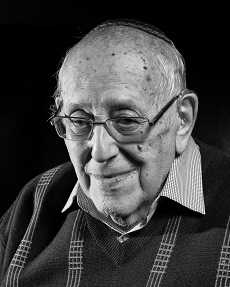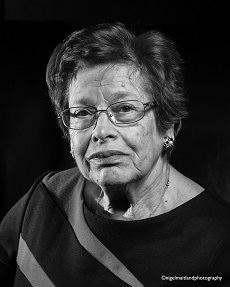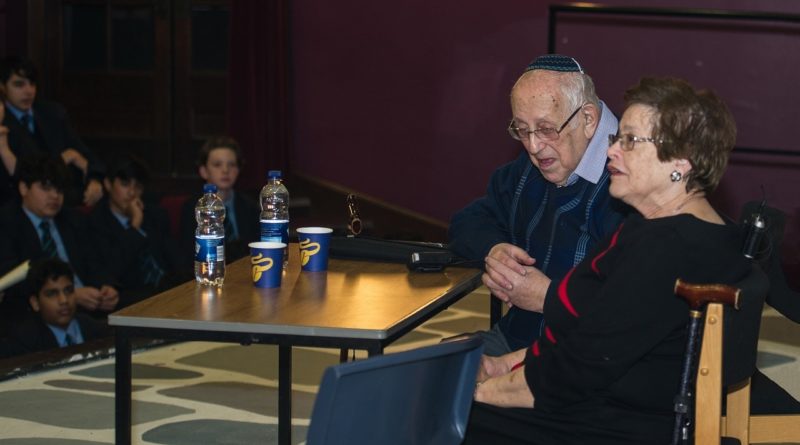Holocaust Memorial Day at The Manchester Grammar School
Ahead of Holocaust Memorial Day the pupils at The Manchester Grammar School were privileged to hear from a husband and wife from Prestwich who survived the atrocities of the Holocaust.
Like Anne Frank, Ruth is known as one of the ‘hidden children of the Holocaust’, and, as a young child, spent the majority of the war in hiding and was forced to disguise her identity. Her husband Werner managed to flee Germany in 1939 on British visa and came to Manchester.
 For decades, Werner was puzzled as to how these visas had been issued as the family could not afford to pay the £50 needed to secure them. It was not until 1990 that Werner learnt the truth. He was contacted by the journalist Michael Smith, who had discovered that a British spy, Frank Foley, who worked in the passport office as his cover, rubber-stamped thousands of visa requests and forged passports, enabling Jews to escape to Britain and Palestine.
For decades, Werner was puzzled as to how these visas had been issued as the family could not afford to pay the £50 needed to secure them. It was not until 1990 that Werner learnt the truth. He was contacted by the journalist Michael Smith, who had discovered that a British spy, Frank Foley, who worked in the passport office as his cover, rubber-stamped thousands of visa requests and forged passports, enabling Jews to escape to Britain and Palestine.
Werner said: “I consider myself to be one of the lucky ones. Frank Foley is a saintly person who saved my life and thousands of others”
Ruth, who was born in Hamburg, emigrated to Amsterdam with her family after the traumatic events of Kristallnacht in 1938. However, after the Germans invaded Holland, the situation for Jews grew steadily worse, forcing Ruth’s father to take drastic action. She said: “In view of this life-threatening scenario, my father turned out attic storage rooms into bedrooms, where we would spent the nights to give the Germans the impression our flat was empty.” When Jews were made to wear yellow stars to identify themselves, her parents realised it would be too dangerous for the family to stay together and risk being found by the Germans, so six-year-old Ruth and her three-year-old brother went to leave with a Dutch couple who offered them sanctuary. Ruth had to change her identify and take her mother’s maiden name, adopting the identity of a non-Jewish orphan who had lost her parents in a bombing, so that the Nazis would not discover she was Jewish.
 In 1943, someone tipped-off the Nazis that the couple, whom Ruth called Auntie and Uncle, were harbouring Jewish children, so Ruth and her brother Karel were taken to a police station, and then to the children’s department of the deportation centre. A nursery nurse who worked there helped to keep girl’s Jewish identity hidden. When the SS called to round-up the children, Ruth was rushed outside and hidden in a sandpit until a non-Jewish student from the underground movement opposed to the Nazis ushered Ruth, in secret, to a train station where she was taken to Limburg and given refuge by a Christian family.
In 1943, someone tipped-off the Nazis that the couple, whom Ruth called Auntie and Uncle, were harbouring Jewish children, so Ruth and her brother Karel were taken to a police station, and then to the children’s department of the deportation centre. A nursery nurse who worked there helped to keep girl’s Jewish identity hidden. When the SS called to round-up the children, Ruth was rushed outside and hidden in a sandpit until a non-Jewish student from the underground movement opposed to the Nazis ushered Ruth, in secret, to a train station where she was taken to Limburg and given refuge by a Christian family.
Sadly, her brother had to stay behind as he had contracted polio, and Ruth herself contracted the disease just two weeks later. She got lucky again – the doctor who treated her in hospital also kept her Jewish identity secret to protect her from the Nazis. Upon her discharge, the underground movement again came to her rescue, taking her to a home for mentally and physically handicapped children in Amsterdam, where the matron hid the Jewish children.
After the war ended, her parents were traced through the Red Cross and the family was reunited. Ruth moved to Manchester in 1962 where she met Werner, and they have recently celebrated their Emerald Wedding Anniversary (55 years).
Ruth said: “Necessity is a good teacher, and we coped. I was one of the lucky ones and I will never forget it. I often think where would I have been without the bravery of those people in the face of terror? The couple who took us in, the nurse, the student who helped me escape, the couple in Limburg, the doctor who kept my identity hidden, and the matron. I fervently hope and pray for universal peace. I talk about my experiences, so people never forget what happened.”
Dan Farr, a teacher at The Manchester Grammar School, said: “Our boys were incredibly privileged to hear from Ruth and Werner. In their speeches, the boys heard about the best and the worst of human nature, and I’m sure they will be inspired by the incredible acts of bravery by the people who offered Ruth sanctuary and Frank Foley, and hopefully that will inspire them to continue to tell the stories of Holocaust survivors so they are never forgotten.”






